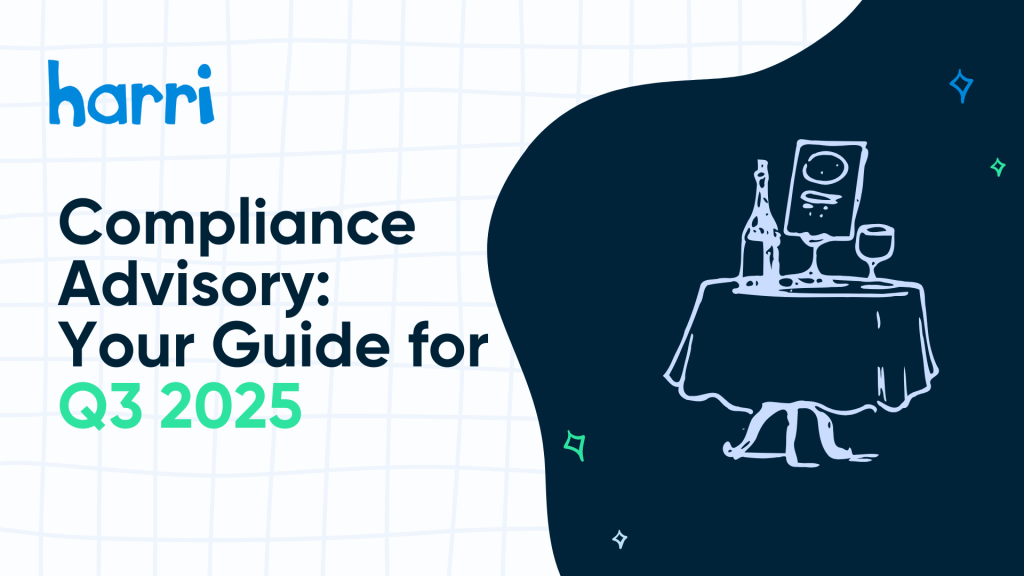Essential Updates on Labor Regulations: Compliance Advisory Q3 2025

- By Harri Insider Team | October 3, 2025
Disclaimer: Please note this advisory is intended for summary purposes only. Any guidance or materials provided do not constitute legal advice and cannot be substituted for the advice of legal counsel.
California Adopts Regulations on AI and Automated-Decision Systems
Effective October 1, 2025, California implements new regulations under the Fair Employment and Housing Act (FEHA) to address the use of artificial intelligence (AI) and automated-decision systems (ADS) in employment. The state’s Civil Rights Council approved these amendments to Title 2 of the California Code of Regulations to prevent discrimination resulting from the use of these technologies. The regulations mandate that employers may not use an ADS that discriminates against individuals based on any characteristic protected under FEHA and stipulate that personnel and employment records, including applications, data from automated decision systems, and selection criteria, must be preserved for a period of at least four (4) years.
California Clarifies Good Faith Defense in Minimum Wage Cases
In a ruling effective immediately, the California Supreme Court has raised the standard for employers seeking to avoid liquidated damages in cases involving minimum wage violations. The court’s decision in Laurance Iloff v. Cynthia LaPaille et al. holds that an employer must demonstrate a reasonable, proactive effort to determine and comply with its legal obligations to establish a “good faith” defense under Labor Code § 1194.2. Simply being unaware of the law’s requirements is no longer an adequate defense. Based partly on the federal Fair Labor Standards Act (FLSA), the court’s reasoning requires employers to take “active steps” to ensure compliance. This decision places a greater burden on employers, particularly those with informal or non-traditional worker arrangements, to document concrete steps taken to understand their wage payment duties to avoid the automatic imposition of liquidated damages.
California Strengthens Gratuity Enforcement
Effective January 1, 2026, Senate Bill 648 requires employers to remit the full value of a tip charged to a consumer’s credit card to the employee, without deducting for credit card processing fees. These payments must be made by the next regular payday.
To ensure compliance, SB 648 also grants the Labor Commissioner new enforcement powers. The Commissioner is explicitly authorized to investigate violations, issue citations, and file civil actions to recover misappropriated gratuities, following the same process used for minimum wage violations under Labor Code § 1197.1.
Colorado AI Act Compliance Deadlines Extended
During its six-day special legislative session in August, Colorado extended the compliance deadlines for its comprehensive Artificial Intelligence Act (The Act) with the signing of SB25B-004, moving the effective date from February 1, 2026, to June 30, 2026. The Act requires developers and deployers of “high-risk” AI systems, including those used for employment decisions, to conduct impact assessments, provide notices to consumers, and implement risk management programs. The delay suggests an additional overhaul of the Act in the upcoming regular legislative session.
Illinois Mandates Paid Breaks for Nursing Mothers
Effective immediately, Illinois has amended the Nursing Mothers in the Workplace Act to require that employers pay employees their regular rate of pay for breaks taken to express breast milk. According to Public Act 104-0076, which amends 820 ILCS 260/10, employers must provide reasonable paid break time for this purpose for up to one year after a child’s birth. This time must be compensated at the employee’s regular rate of pay, and employers cannot require an employee to use their existing paid leave for such breaks. Employers in Illinois should update their policies accordingly, noting that an exception exists only if providing paid breaks would create an “undue hardship” under the Illinois Human Rights Act.
Maine Enacts Reporting Time Pay Requirement
Effective September 24, 2025, Maine employers must compensate employees for scheduled shifts that are canceled or shortened upon their arrival at work. L.D. 598 applies to employers with 10 or more employees and mandates payment of the lesser of two hours of pay at the employee’s regular hourly rate or the total pay for the originally scheduled shift.
Oregon Expands Age Discrimination Protections in Hiring
A new Oregon law, House Bill 3187, restricts employers from inquiring about an applicant’s age or graduation dates during the early stages of the hiring process. Effective September 28, 2025, an employer may not request an applicant’s age, date of birth, or dates of school attendance or graduation before completing an initial interview, or, if no interview is conducted, before making a conditional offer of employment. Exceptions are permitted only when the information is needed to verify a bona fide occupational qualification (BFOQ) or to comply with other laws.
Oregon Enacts Paycheck Transparency Law
Effective January 1, 2026, Oregon’s Senate Bill 906 will create new transparency requirements for employers regarding pay rates and deductions. At the time of hire, employers must provide employees with a written explanation of potential earnings and deductions that may appear on their pay stubs. This notice must include a comprehensive list of all pay rates, potential benefit deductions and contributions, and the purpose of each deduction. Employers must also provide a list of all payroll codes used for pay and deductions, along with a detailed description of each. This information, which can be provided electronically, must be reviewed and updated annually.
Rhode Island Clarifies Sunday and Holiday Premium Pay Rules
As of August 17, 2025, new rules from the Rhode Island Department of Labor and Training (DLT) clarify premium pay requirements for work performed on Sundays and holidays. Regulation 260-RICR-30-05-2 defines “retail businesses” and specifies that these employers can count hours paid at the Sunday/holiday premium rate toward any weekly overtime hours an employee works. The regulation also establishes several classes of employers that are now exempt from the requirement to pay 1.5 times their regular wages for work on Sundays and holidays. These exempt employers include non-profit higher education institutions, licensed private security guard businesses, 24/7 motor-vehicle roadside assistance call centers, certain manufacturers, and 24/7 animal rescue facilities.
Texas Enacts AI Governance Framework
On June 22, 2025, Texas passed the Responsible Artificial Intelligence Governance Act (known as “TRAIGA 2.0”), which establishes a statewide framework for AI systems. Effective January 1, 2026, Texas House Bill 149 prohibits the development or deployment of an AI system with the intent to discriminate unlawfully. The new law does not allow a private right of action; instead, the Texas Attorney General is granted exclusive authority to enforce the statute.
Washington Pay Transparency Litigation Risk Increases, but New Cure Period Provides Relief
Two recent developments have impacted Washington’s pay transparency law (RCW 49.58.110). First, a recent Washington Supreme Court ruling in Branson v. Washington Fine Wine & Spirits on September 4, 2025, has expanded litigation risk under the state’s Equal Pay and Opportunities Act (EPOA) by broadly defining “job applicant” to include anyone who applies for a job, regardless of their intent. Second, a legislative amendment to RCW 49.58.110 (SB 5408), which took effect July 27, 2025, has reduced statutory damages and, critically, established a temporary safe harbor. From July 27, 2025, through July 27, 2027, an employer has five business days to correct a non-compliant posting after receiving written notice of a violation. If corrected within this window, penalties and damages may not be assessed for that specific violation, making a rapid-response process essential for employers.
Cleveland, Ohio, and Massachusetts Pay Transparency Begins October 2025
Two jurisdictions have established new regulations regarding salary transparency requirements. Under Ordinance No. 104-2025, effective October 27, 2025, the city of Cleveland will require employers with fifteen (15) or more employees within the city to provide the salary range or scale for a potential job in any advertisement, notification, or other formal job posting.
Effective October 29, 2025, “An Act Relative to Salary Range Transparency” establishes new salary transparency requirements for employers with twenty-five (25) or more employees in the state of Massachusetts. In every job posting, an employer must disclose the pay range for a specific job in any advertisement or posting for the position, as well as provide the pay range to a current employee who is offered a promotion or transfer to a new position with different responsibilities.
Harri, your partner in compliance. As employment regulations continue to evolve, Harri stands by your side, ready to help you manage these changes. Recognized for our expertise in employer technology solutions, we focus on equipping you with the necessary tools and insights to support your compliance efforts. Choose Harri as your partner in compliance.





















